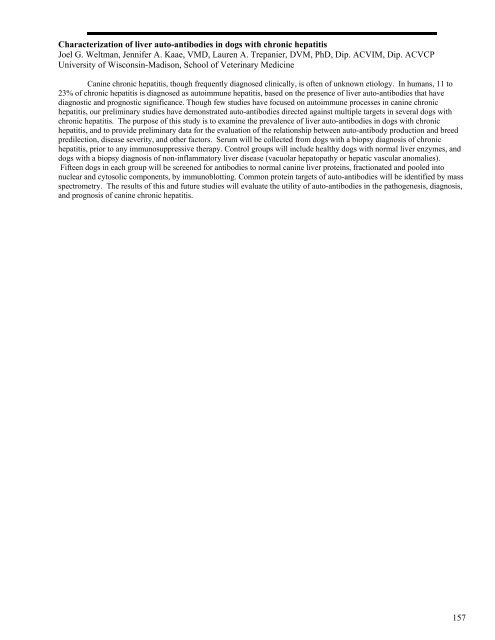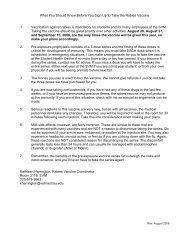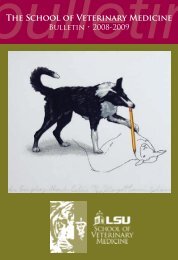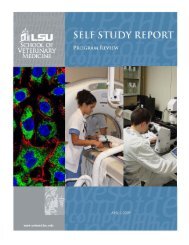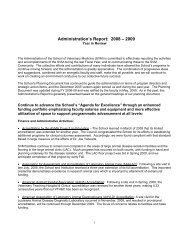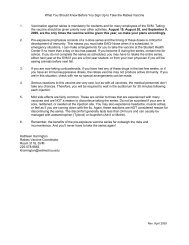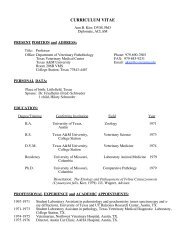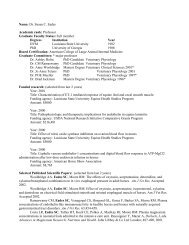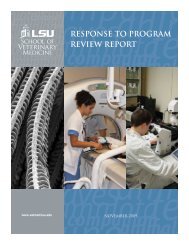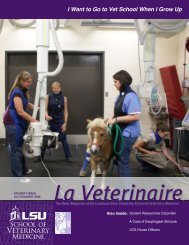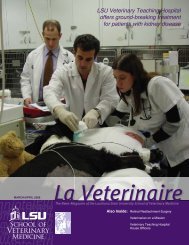(PBMC) were isolated using commercial cell separation tubes. Tissues from the synovium and ruptured ACL were incubatedwith Collagenase B for tissue digestion. Mononuclear cells were isolated from these tissues using Percoll density gradientcentrifugation. PBMC and synovial/CCL mononuclear cells were then blocked and stained with fluorochrome-labeled anticaninemonoclonal antibodies (CD3-FITC, CD4-RPE, CD8-RPE/Alexa Fluor 647), and then fixed in 2% paraformaldehydein PBS for FACS analysis.The percentage <strong>of</strong> CD4+ and CD8+ T lymphocytes was determined using a FACS Calibur flow cytometer. Datawas analyzed using CellQuest s<strong>of</strong>tware and the Student’s t test.Results: Large numbers <strong>of</strong> CD4+ and CD8+ T lymphocytes were identified in stifle joint tissues.Discussion: PendingRole <strong>of</strong> aging in antioxidant deficiencies in dogsMoyer K, Trepanier LAUniversity <strong>of</strong> Wisconsin-Madison, <strong>School</strong> <strong>of</strong> <strong>Veterinary</strong> <strong>Medicine</strong>, Madison, WI, USAGlutathione plays a key role as an intracellular antioxidant in protecting mammalian cells from oxidative damage.Low levels <strong>of</strong> glutathione have been reported in geriatric humans and are associated with higher blood pressure andincreased morbidity. Cysteine, in addition to being a key component <strong>of</strong> glutathione, is an important extracellular antioxidantand is the rate-limiting component in the synthesis <strong>of</strong> glutathione. Decreased levels <strong>of</strong> antioxidants have been shown in agedbeagles but have not been investigated in the heterogenous population <strong>of</strong> client-owned dogs. Low levels <strong>of</strong> antioxidants arelikely to be clinically significant in dogs as well as humans, and decreased activities <strong>of</strong> the two enzymes involved in thesynthesis <strong>of</strong> glutathione, gammaglutamyl cysteine synthetase (GGCS) and glutathione synthetase (GS), may explain theselow levels.The purpose <strong>of</strong> this study is to characterize the presence <strong>of</strong> glutathione and cysteine in healthy aged caninescompared to healthy young controls within a heterogeneous client-owned population. Young (1-3 years <strong>of</strong> age) and old (> 9years <strong>of</strong> age) dogs that are clinically normal and have normal CBC and biochemical panels will be recruited. HPLC will beused to measure erythrocyte total and reduced glutathione and plasma cysteine concentrations. In addition, the activities <strong>of</strong>GGCS and GS will be determined in erythrocytes. We hope to determine whether age-related glutathione depletion can beassociated with decreased cysteine availability, impaired glutathione synthesis, or increased glutathione oxidation.The Green Cheek Conure (Pyrrhura molinae) as a model to study arthritic pain and response to longactingliposome encapsulated butorphanolRenee Tourdot, BS*, Joanne Paul-Murphy, DVM, Kurt Sladky, DVM, Lisa Krugner-Higby, DVM, PhD, JuliaKlauer, BSUniversity <strong>of</strong> Wisconsin <strong>School</strong> <strong>of</strong> <strong>Veterinary</strong> <strong>Medicine</strong>Madison, WI 53706Adequate pain management is vitally significant to the therapeutic treatment <strong>of</strong> all animals, including birds. Thequantification <strong>of</strong> pain and pain-related behavior is necessary to assess analgesic drug efficacy. Recently, the Paul-Murphylaboratory has established a working arthritis model to evaluate tonic pain in Hispanolian parrots. This model mimics clinicalinflammatory pain applicable to the treatment <strong>of</strong> acute arthritis in avian species.This pilot study is designed to adapt a smaller species, the green-cheeked conure (GCC), to the laboratory setting,the arthritis model, and the testing techniques that have been previously established with a larger psittacine species. Thisproject examines the attenuation <strong>of</strong> tonic pain in GCCs following administration <strong>of</strong> liposome encapsulated butorphanol(LEBT) (15mg/kg). In this tonic pain model using 8 GCCs, a small volume <strong>of</strong> urate crystals is injected into one intertarsaljoint and is expected to cause lameness and decreased weight bearing on the affected limb. Each bird is evaluated under fourdifferent conditions: 1) no arthritis, no LEBT, 2) no arthritis with LEBT, 3) arthritis without LEBT, 4) arthritis with LEBT.Response to pain is evaluated by four methods: 1) an incapacitance meter to measure the average amount <strong>of</strong> force each footexerts simultaneously during a 30s sampling period, 2) a rotating perch to challenge the bird to remain on it while rotating at7.5rpm for a 60s sampling period, 3) behavioral data to quantify voluntary actions in response to pain, 4) correlation <strong>of</strong> fecalcorticosterone concentrations with pain.Preliminary results indicate that maximum arthritic pain is established 6 hours after the injection <strong>of</strong> urate crystals.We anticipate a significant decrease in weight bearing for all birds on the arthritic leg 2-6 hours post-injection. ArthriticGCCs treated with LEBT are predicted to bear more weight on the arthritic leg than without analgesic drug administration.We also expect that birds given LEBT will return to control values sooner than when not given an analgesic. Untreatedarthritic GCCs are expected to have more difficulty manipulating the rotating perch than those receiving the analgesic.Behaviorally, we predict a marked decrease in voluntary behaviors as pain increases, and stress-induced fecal cortisol levelsshould increase likewise.156
Characterization <strong>of</strong> liver auto-antibodies in dogs with chronic hepatitisJoel G. Weltman, Jennifer A. Kaae, VMD, Lauren A. Trepanier, DVM, PhD, Dip. ACVIM, Dip. ACVCPUniversity <strong>of</strong> Wisconsin-Madison, <strong>School</strong> <strong>of</strong> <strong>Veterinary</strong> <strong>Medicine</strong>Canine chronic hepatitis, though frequently diagnosed clinically, is <strong>of</strong>ten <strong>of</strong> unknown etiology. In humans, 11 to23% <strong>of</strong> chronic hepatitis is diagnosed as autoimmune hepatitis, based on the presence <strong>of</strong> liver auto-antibodies that havediagnostic and prognostic significance. Though few studies have focused on autoimmune processes in canine chronichepatitis, our preliminary studies have demonstrated auto-antibodies directed against multiple targets in several dogs withchronic hepatitis. The purpose <strong>of</strong> this study is to examine the prevalence <strong>of</strong> liver auto-antibodies in dogs with chronichepatitis, and to provide preliminary data for the evaluation <strong>of</strong> the relationship between auto-antibody production and breedpredilection, disease severity, and other factors. Serum will be collected from dogs with a biopsy diagnosis <strong>of</strong> chronichepatitis, prior to any immunosuppressive therapy. Control groups will include healthy dogs with normal liver enzymes, anddogs with a biopsy diagnosis <strong>of</strong> non-inflammatory liver disease (vacuolar hepatopathy or hepatic vascular anomalies).Fifteen dogs in each group will be screened for antibodies to normal canine liver proteins, fractionated and pooled intonuclear and cytosolic components, by immunoblotting. Common protein targets <strong>of</strong> auto-antibodies will be identified by massspectrometry. The results <strong>of</strong> this and future studies will evaluate the utility <strong>of</strong> auto-antibodies in the pathogenesis, diagnosis,and prognosis <strong>of</strong> canine chronic hepatitis.157
- Page 1 and 2:
2006 MERCK/MERIALNATIONAL VETERINAR
- Page 6 and 7:
3:00-3:30 pm BreakNovel therapy for
- Page 8 and 9:
KEYNOTE SPEAKERRonald Veazey, D.V.M
- Page 10 and 11:
Mini Symposium II:Fish Research: A
- Page 12 and 13:
David G. Baker, D.V.M., M.S., Ph.D.
- Page 14 and 15:
Konstantin G. Kousoulas, Ph.D.Profe
- Page 16 and 17:
Joseph Francis, B.V.Sc., M.V.Sc., P
- Page 18 and 19:
dogs with cancer, the potential rol
- Page 20 and 21:
2006 MERCK/MERIALVETERINARY SCHOLAR
- Page 22 and 23:
YOUNG INVESTIGATOR AWARD HONORABLE
- Page 24 and 25:
Mammary epithelial-specific deletio
- Page 26 and 27:
2006 MERCK/MERIALVETERINARY SCHOLAR
- Page 28:
Variation in Q-Tract Length of the
- Page 34:
Novel therapy for humoral hypercalc
- Page 38:
ALTERNATE:Micron-scale membrane sub
- Page 42 and 43:
ABSTRACT TITLES LISTED BY CATEGORY
- Page 44 and 45:
19. A pilot study of cigarette smok
- Page 46 and 47:
36. Development of a murine in vitr
- Page 48 and 49:
ABSTRACT TITLES LISTED BY CATEGORY
- Page 50 and 51:
71. Identification and characteriza
- Page 52 and 53:
85. Age and Gender Influence Ventil
- Page 54 and 55:
ABSTRACT TITLES LISTED BY CATEGORY
- Page 56 and 57:
2006 MERCK/MERIALVETERINARY SCHOLAR
- Page 58 and 59:
10. Preliminary estimation of risk
- Page 60 and 61:
ABSTRACT TITLES LISTED BY CATEGORY
- Page 62 and 63:
47. Osteoprotegerin and Receptor Ac
- Page 64 and 65:
61. A Comparison of Interaction Pat
- Page 66 and 67:
ABSTRACT TITLES LISTED BY CATEGORY
- Page 68 and 69:
ABSTRACT TITLES LISTED BY CATEGORY
- Page 70 and 71:
ABSTRACT TITLES LISTED BY CATEGORY
- Page 72 and 73:
2006 MERCK/MERIALVETERINARY SCHOLAR
- Page 74 and 75:
used to label avian heterophils for
- Page 76 and 77:
obtained via analysis of time and d
- Page 78 and 79:
0.71mg/dL; p=0.001). Values for hem
- Page 80 and 81:
mass and fecundity in prespawning w
- Page 82 and 83:
Equine Hoof Laminae Tissue Collecti
- Page 84 and 85:
Aspiration Pneumonia in DogsDavid A
- Page 86 and 87:
Distortion Product Otoacoustic Emis
- Page 88 and 89:
tyrosine phosphorylation is measure
- Page 90 and 91:
the gravid and non-gravid females t
- Page 92 and 93:
egulatory function as its ortholog,
- Page 94 and 95:
PATHOLOGY, TOXICOLOGY, AND ONCOLOGY
- Page 96 and 97:
Markers of Oxidative Stress in plas
- Page 98 and 99:
has been isolated from all samples
- Page 100 and 101:
Matrix metalloproteinase secretion
- Page 102 and 103:
Reproductive performance, neonatal
- Page 104 and 105:
control to determine the efficiency
- Page 106 and 107: Enhancing the Quality and Reliabili
- Page 108 and 109: grade II MCTs into groups with good
- Page 110 and 111: Transcriptional Regulation of the I
- Page 112 and 113: MICROBIOLOGY AND IMMUNOLOGY (SESSIO
- Page 114 and 115: colonization of the mutant and 6 re
- Page 116 and 117: digestive tracts of these and other
- Page 118 and 119: 100 pfu BRSV. The results show that
- Page 120 and 121: Inhibition of Microneme Secretion i
- Page 122 and 123: Adherent bacilli were present in th
- Page 124 and 125: isolated to analyze cytokine gene e
- Page 126 and 127: purified, viral RNA was extracted a
- Page 128 and 129: The effects of co-engagement of TLR
- Page 130 and 131: Occurrence of Leptospira Vaccine Fa
- Page 132 and 133: undifferentiated catecholaminergic
- Page 134 and 135: the concept that the greater detoxi
- Page 136 and 137: quantitative PCR using gene targets
- Page 138 and 139: Rotenone Induced Dopamine Neuron De
- Page 140 and 141: decrease in serum cortisol, with a
- Page 142 and 143: and detrimental impacts on the brai
- Page 144 and 145: actions of cells prior to embryo de
- Page 146 and 147: Utilizing cDNA Subtraction to Exami
- Page 148 and 149: expression in unilaterally pregnant
- Page 150 and 151: Salmonella is increased. Poultry sa
- Page 152 and 153: exports. The estimated prevalence o
- Page 154 and 155: eeding grounds near Minnedosa, MB s
- Page 158 and 159: 2006 MERCK/MERIALVETERINARY SCHOLAR
- Page 160 and 161: Trainees acquire in-depth knowledge
- Page 162 and 163: comparative pathology and/or resear
- Page 164 and 165: Department of Veterinary Bioscience
- Page 166 and 167: PhD, Director, Center for Comparati
- Page 168 and 169: 2006 MERCK/MERIALVETERINARY SCHOLAR
- Page 170 and 171: MICHIGAN STATEUNIVERSITYJames Crawf
- Page 172: UNIVERSITY OFPENNSYLVANIALindsay Th


